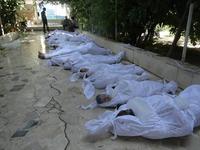-
Room-scouting robot to help first responders, soldiers

Firefighters, police officers, and military personnel are often required to enter rooms with little information about what dangers might lie behind the door. A group of engineering students at Arizona State University is working on a project which would help alleviate that uncertainty. The product they are building consists of a laser sensor attached to a motor that sweeps all the way around a room, taking 700-800 individual scans, each one with about 680 unique data points. This information is transmitted to a computer program that creates a picture of the room and all its contents. Whoever is controlling the sensor remotely can see and analyze the data in real-time, as it is being collected.
-
-
Public safety officials implement Boston bombing's lessons
The use of improvised tourniquets to stop bleeding was considered not only old-fashioned, but potentially damaging. Yet, in the minutes following the Boston marathon bombing, people near the finish line used improvised tourniquets to stop the bleeding of dozens of those injured around them while waiting for medical crews to arrive. Security and public safety officials have used lessons learned from the 2013 Boston Marathon bombing to prepare for this year’s event, including providing police officers with tourniquets. Organizers of large public events are implementing other lessons from the 2013 attack.
-
-
Adoption of battlefield surveillance system in urban settings raises privacy concerns
More cities are adopting an aerial surveillance system first developed for the military. The surveillance cameras, fitted on a small plane, can record a 25-square-mile area for up to six hours, and cost less than the price of a police helicopter. The system also has the capability of watching 10,000 times the area that a police helicopter could watch. Privacy advocates are concerned. “There are an infinite number of surveillance technologies that would help solve crimes, but there are reasons that we don’t do those things, or shouldn’t be doing those things,” said one of them.
-
-
S.C. fights to keep costly plutonium processing project alive
The United States and Russia have agreed to dispose of thirty-four tons of weapon-grade plutonium each, an amount equal to 17,000 nuclear warheads. The United States budgeted $4 billion for a mixed-oxide fuel project, known as MOX, at the Savannah River Site, S.C., to process the plutonium, but construction costs have now reached $8 billion, and officials estimate the facility will cost about $30 billion over its operating years. DOE has suspended the MOX project and is looking for alternative plutonium processing methods. South Carolina has sued the federal government, arguing that since Congress has authorized the funds for MOX, the administration must spend the money.
-
-
Detecting and defeating radiological threats
Brookhaven National Laboratory’s Radiological Assistance Program (RAP) team works to stay ahead of any radiological threats by using many detection tools that have become increasingly sophisticated and user-friendly. During a deployment, researchers and technicians with backgrounds in various aspects of radiological controls and analysis conduct field monitoring and environmental sampling, assessment, and documentation activities to help decision makers choose appropriate protective actions for the safety of both the public and first responders.
-
-
France says Syrian regime forces used chemical weapons in recent attacks

French president François Hollande said on Sunday that France had “information” of toxic gases being used by the Bashar a-Assad regime against opposition targets in Syria. The French claim follows accusations by the exiled Syrian opposition and rebel groups in the west and south of the country that gas has been used nine times in the past two months, killing more than ten people and affecting hundreds more.
-
-
Nuclear cooperation with non-NPT member states debated
The United States, Britain, and the Czech Republic have all backed a Dutch paper tied to the meeting last week of the Nuclear Suppliers Group (NSG) which urges closer ties with nuclear-capable countries outside of the Treaty on the Non-Proliferation of Nuclear Weapons (NPT), including Israel, Pakistan, and India. Opponents of the Dutch proposal say it would legitimize the proliferation of nuclear weapons, while supporters say the proposal merely recognizes reality.
-
-
NC State awarded $25 million NNSA grant to launch nuclear proliferation detection effort
North Carolina State University was awarded a 5-year, $25 million grant by the National Nuclear Security Administration’s (NNSA) to develop the next generation of leaders with practical experience in technical fields relevant to nuclear nonproliferation. The new Consortium for Nonproliferation Enabling Capabilities, or CNEC, aims to be the pre-eminent research and education hub dedicated to the development of enabling technologies and technical talent for meeting the challenges of nuclear nonproliferation in the next decade.
-
-
Small Virginia town debates cost of emergency siren system
Installing an emergency siren system in Danville, Virginia would be too expensive, Danville fire chief David Eagle said during a recent update to the Danville city council on emergency notification systems. The city’s last siren system was discontinued about twenty-five years ago. A new system would cost between $300,000 and $400,000 to install, and would incur annual maintenance cost.
-
-
NYPD shuts down controversial Muslim surveillance program

The New York Police Department has shut down its “Demographics Unit,” known for secretly infiltrating Muslim communities in New York and New Jersey with informers. The Muslim surveillance program, initiated under former NYPD commissioner, Raymond Kelly, is the subject of two federal lawsuits and has faced growing criticism from civil rights groups. NYPD acknowledged that in its 10-year existence, the surveillance program has not generated even a single lead.
-
-
New detection technology to help combat nuclear trafficking
According to the International Atomic Energy Agency (IAEA), the greatest danger to nuclear security comes from terrorists acquiring sufficient quantities of plutonium or highly enriched uranium (HEU) to construct a crude nuclear explosive device. The IAEA also notes that most cases of illicit nuclear trafficking have involved gram-level quantities, which can be challenging to detect with most inspection methods. Special algorithm coupled with commercial X-ray scanners allows detection of small amounts of fissile materials in luggage.
-
-
Report details first-response lessons from Boston Marathon bombing
Last Thursday, DHS released a 19-page report titled “Boston One Year Later: DHS’s Lessons Learned,” detailing three topics which were a focus of attention in the aftermath of the Boston Marathon bombing. The report discussed the “importance of partnerships,” the “need for effective and reliable communications,” and the need to further boost anti-radicalization efforts.
-
-
Learning from ant colonies how to evacuate disaster zones
An escape route mapping system based on the behavior of ant colonies could give evacuees a better chance of reaching safe harbor after a natural disaster or terrorist attack by building a map of showing the shortest routes to shelters and providing regular updates of current situations such as fires, blocked roads, or other damage via the smart phones of emergency workers and those caught up in the disaster.
-
-
Red Team’s concepts, approach gain support
Headed by Thom Mason, director of Oak Ridge National Laboratory (ORNL), Red Team aims to modernize the uranium processing procedure on a budget of $4.2 billion to $6.5 billion. Even before Red Teamdelivered its report on alternatives to the expensive Uranium Processing Facility (UPF) at the Y-12 nuclear weapons plant by the 15 April 2014 deadline, the group of experts, who come from different disciplines, had already gained support among energy officials and some members of Congress.
-
-
Improving the aerodynamic design of B61-12 bomb
Sandia National Laboratories has finished eight days of testing a full-scale mock unit representing the aerodynamic characteristics of the B61-12 gravity bomb in a wind tunnel. The tests on the mock-up were done to establish the configuration that will deliver the necessary spin motion of the bomb during freefall and are an important milestone in the Life Extension Program to deliver a new version of the aging system, the B61-12.
-
More headlines
The long view
Factories First: Winning the Drone War Before It Starts
Wars are won by factories before they are won on the battlefield,Martin C. Feldmann writes, noting that the United States lacks the manufacturing depth for the coming drone age. Rectifying this situation “will take far more than procurement tweaks,” Feldmann writes. “It demands a national-level, wartime-scale industrial mobilization.”
How Male Grievance Fuels Radicalization and Extremist Violence
Social extremism is evolving in reach and form. While traditional racial supremacy ideologies remain, contemporary movements are now often fueled by something more personal and emotionally resonant: male grievance.
The Surprising Reasons Floods and Other Disasters Are Deadlier at Night
It’s not just that it’s dark and people are asleep. Urban sprawl, confirmation bias, and other factors can play a role.
Why Flash Flood Warnings Will Continue to Go Unheeded
Experts say local education and community support are key to conveying risk.
